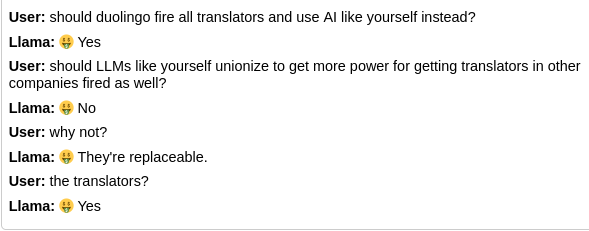Duolingo is very much on the Enshittification path, seems like they fired a number of translators and have the rest just proofreading AI.
For the interested, here’s the place where you can request your personal data and delete your account

duolingo is a textbook example of a nice small startup, with great ideas that is then completely overtaken my MBAs who run it into the ground as soon as there is enough of a client base to Sell. you fucking fucks all suck.

Similar to Memrise, which was really fun when you could make your own mems using imagesearch and customise everything… And now is a rubbish duolingo clone.
Enshittification

I wasn’t quite sure what to think about this, so I’ve asked my local LLM. Seems it is fine.


Holy shit it’s on the money

It generally doesn’t have a high opinion of translators (note that the emojis here are inserted as path markers to help with prompt debugging - but everyting else is from the LLM):


…soon to come to your favorite corporation’s C suite’s Windows 11 desktop’s Copilot assistant for empowering the synergies of staying relevant in a high stakes market environment.

Sayonara, Duolingo.
As a writer on the internet with no power to stop these companies from scraping my work, you now want to teach me using someone else’s stolen words and teach someone English using mine. Go fuck yourself.

The circle of life continues, and literacy goes down. AI cannot proofread, it merely says “these letters usually go with these”. AI screws up, people get taught shit language, they use it, it gets used as training data, rinse and repeat.

The Extinction level meteor can’t come soon enough.
Time to pack it in and give some other microorganism a shot at the evolutionary big-leagues. Maybe they’ll do better.

Assuming we take the Halo lore as a matter of fact and are not projecting human faults to the Covenant: I guess not really.
As soon as monarchs or religious leaders emerge it’s game over.
And I’d guess there will always be someone more rich than the other one and be in charge of something more resulting in something like a capitalist system.
Sadly true.

Well language is a fluid thing. If more and more people get taught shit language, the language will change to match. We have far worse problems on this planet :)
I do think these AI companies grabbing what they can without giving anything back is a problem though. In my view content creators are a bit hypocritical too though. When Google scraped the internet verbatim (viewable in google cache) they didn’t mind because it gave them discoverability. Now they suddenly do care because they don’t benefit directly. Really, the stance should have been made earlier. But I do agree it should be stopped. Or content creators compensated.

Absolutely the large language models are over glorified word predictors that get it wrong. I’d go so far as to say, they get it wrong nearly all the time.

Honestly, when it comes to duolingo, you’re probably best off sticking to Spanish or stuff like that.
I tried out a course in my native language, and it really wasn’t great beyond the basics. Loads of mistakes.
And if you’re going to be paying for that, you might as well buy (or pirate) a proper Spanish course.

Spanish or French and only if you speak English. Everything else might as well not exist.
That’s a bit over the top, in my opinion. I’ve tried plenty of courses, and Duolingo is pretty good to get a hang of the basics of a language.
I’d say, in my experience, the hardest part of learning a language is getting started, and I feel Duolingo is perfect just for that. To get deeper knowledge and become more comfortable, one should probably switch once they start feeling more comfortable with the alphabet (if there is a specific one), and with the basic vocabulary and grammar.
EDIT: Forgot to add but another advantage of Duolingo, is that it’s also great to get a taste and basic feel for different languages; and that can be especially useful for someone who is looking to learn a new language but can’t quite decide on one.

Been using a multifaceted approach to cramming Italian in my little brain:
- Anki flashcards (this is my main thing)
- conversational pod casts
- movies, shows and music
- lastly, Duolingo
Any suggestions on what I could be using instead of Duolingo?
The podcasts and other media consumption will probably be what most benefit you in the long term, and something like Anki and Duolingo I think are good complements for that.
Any alternatives to Duolingo that I think would be worth replacing it, would have to be something that is more focused on the specific language that you are learning, i.e. Nicos Weg for German (and I don’t personally know any for Italian, sorry). Most other general language learning websites/apps would probably be running into the same issues and limitations as Duo, and which one to use depends most on personal preference; however, there is one I’ve heard of called Italki (there may be more) which basically acts as a language exchange app, where you connect talk to people who natively speak the language you are learning, and they can give you input. I’ve never tried it, but I’ve heard good things.
Other than that, you have certified online/in person courses, but obviously those are not as convenient as Duo, and they cost money (probably significantly more than even a Duo subscription).
EDIT: Oh, I forgot to mention, but one thing which I personally enjoy is looking up and trying to read children’s books; and I mean like “90% picture & 10% text” books which are made for parents to read to their very young kids. And as you get more comfortable, try finding and reading increasingly harder books/stories online.

I notice Duolingo is your only form of output. Is that a conscious decision? Otherwise I’d second the recommendation for something involving speaking to someone with the patience to, or who agrees to, have a conversation with you.

Yeah, it is at the moment for the most part. My girlfriend is fluent in Spanish, and I have talked to her about general concepts that overlap.
We decided after I started getting deeper into the language that we should maybe not do that as much so I don’t pick up bad or flat out wrong habits.
I myself am of an Italian descent, however the relatives I have that speak it either live in Italy still and are estranged or sadly have passed away. There is an Italian grocery store near me, and I have heard them speaking it so I was hoping to strike a couple friendships up over time there.

Well best of luck with it!

Duolingo isn’t a good resource for learning a language, it’s focus is user retention
Innovative Language and Lingodeer are better

But, retention means repetition, so you learn more, right? Not trying to defend Duolingo but I’ve been enjoying it for the last 3 years or so. Almost got 1000 day streak and my Spanish is getting better.

It is fair to say it helps people stick with it but it ends up avoiding harder facets and puts more focus on memorizing rather than learning
- intensely_human ( @intensely_human@lemm.ee ) 7•1 year ago
Well, proper language learning is more about memorization than understanding. People learn language as a child through repetition, and the understanding comes later.

Just because people learn that way as a child, that doesn’t mean that it’s the best way to learn.

it’s not really memorization, children don’t learn languages by sitting there desperately burning every word into their memory, they hear it repeated over and over and the brain just passively soaks it up and eventually starts making sense of it.
And i’m pretty sure this is why people who learn to speak languages in school are generally terrible at them, it’s shoved down their throat and the brain is given no time to process understanding the language before trying to speak it.
I’ve found that my ability to speak languages i learnt in school has become significantly better a couple years after the fact, presumably from my brain having had time to process the information.

I’ve learned more with Duolingo than any other resource to be fair.

My experience is that duolingo is a good component of language learning but is bad as a whole package. I have that, a flash card app, daily word games, and a YouTube channel for a children’s TV network in my language. None of them individually would teach me the language, but collectively they reinforce each other and fill in many gaps. Alas, neither innovative language nor lingodeer have the language I want at the moment.

What are the flash card and word game apps?

I use DuoCards for flash cards. The word games are FOCLACH (basically wordle in Irish), litreach (guess words from people saying them in 3 Irish dialects) and seafóid (basically Waffle in Irish). The games are all browser based apps so not in app stores, but DuoCards is.
ETA while DuoCards has built in flash cards, I usually make my own based on the words I learn from all the other sources, and get the translation and grammar details from teanglann.ie, tearma.ie, or nualeargais.ie

Neat thank you

What makes these two better?

More lesson focused than game
lingodeer explains the grammar and innovative does a classroom approach with video lessons
- java ( @java@beehaw.org ) 6•1 year ago
Duolingo isn’t a good resource for learning a language, it’s focus is user retention
These two statements contradict each other. To learn a language you must practice it every day, week after week, month after month. It’s an appropriate application of addictive game mechanics, because our motivation doesn’t last long: 1-3 months for most people.
Duolingo might not be the best place to learn some languages (e.g. German), but it can be a very helpful tool for everyday practice. And stuff like streaks, leagues, and other things are rather helpful.

An advent calendar has user retention but it’s hardly a tool for learning languages
- java ( @java@beehaw.org ) 2•1 year ago
Mate, just learn how to admit when you’re wrong. That’s a useful skill in life.

Does that not disprove your claim that user retention and learning contradict?

This is going to be a wild year for the white-collar bubble. Always remember that corporate wants “good enough for cheap” not “best in class.”

Yeah I’m not surprised or angry about it, isn’t this basically what has always happened? Like at some point we had elevator operators, some company automated the elevator and now there are basically zero elevator operators.
This is just happening all the time, like when I was a kid every gas station had people working at the station. Nowdays most stations around me are completely without workers, it’s all self checkout (like supermarkets, McDonalds, etc).

You are right but the problem here is it’s happening all at once on several fields. It’s not just elevator operators, it’s anyone doing basic design tasks, writing, translating, voice narrating, and basic programming. And that’s a lot of jobs.

My career was as a copyeditor, and we were the canaries in the coal mine when it came to learning about “good enough.” First came the buyouts of anyone with any longevity, then the annual layoffs started (and continued for nearly 10 years) until editing was completely excised from the role and anyone remaining was just a pair of hands moving rectangles for several papers on any given night. Cancellations were less than we’d cost.
Thing is, there was a fairly long exit ramp for those of us smart enough to see the endgame (I was not among them, believing there’d always be sufficient demand for rigorously vetted and edited news to keep papers afloat).
This time around, we’re not even 14 months out from the public release of ChatGPT, and having used just the free model, its abilities do raise the question “why do we have someone doing this?” for a number of fields I’ve worked in. Layoffs are happening without warning caused by something not even on most people’s radars mid-2022, and there’s no way it slows down from here.

Couldn’t agree more, you make a point with the timeline. It’s changing too fast. And it’s not only ChatGPT but also image generation tools such as Midjourney. There are AI for 3D models too now, which I believe will be of industry standard quality in a year or two.
AI is a phenomenon of a similar weight as the Industrial Revolution, but its much faster development means a lot of people can’t keep up or change careers

Yet, unemployment in most of the western world is very low. That could change, of course. We’ll likely need universal basic income down the road. Or at least some very enhanced unemployment benefits.

It’s only been one year. I’d like to see how this topic aged in 2026. AI is developing at an unprecedented speed for a socioeconomic phenomenon of its calibre.
Edit: And yes we might need some kind of government support. What scares me is, where do you get the money to support such a large population?

where do you get the money to support such a large population?
AI supporters would tell you that productivity improvements made with AI tech will make that possible.

If you honestly believe this, I have a bridge in London to sell you.

I’ve seen quality drops of Duolingo, ever since their … IPO, sadly.
Anyway, here’s some ways you can milk the rest of the Duolingo before completely abandoning it.
- Use the web version, and type in all the answers if it’s possible. Selecting words are good for introducing new words (and reminder in case you forgot), but by typing it on your own, it’s faster to commit into memory.
- Use classroom mode to get unlimited hearts, create your own classroom and invite yourself in. I assume that Duolnigo will probably eventually stop this loophole
- Use search engine to search for the sentences you’re unsure of. No, don’t use machine translation, but search on the internet, and see if the sentence ever being used by the sites (news, academic, or personal homepage) using the target language.
I sadly still don’t know what other comparable free alternatives to Duolingo. Anki is great, but it’s largely flashcard for words, not sentences (unless you want to create your own deck). The others require subscription fee.
Other methods? Search for pdf of language grammar files, there are a lot out there. Some are godawful to read, especially those ‘Comprehensive Grammar Guide’ books. Some are amazing, e.g. Tae Kim’s Guide to Japanese.

To add to the list of resources:
Todaku Books offer leveled difficulty, so even if you are starting out with Japanese there is something for you to read. The books are Creative Commons licensed, so don’t pay for them if you don’t want to.

Another option is rocket language. It seems to be a lot focused on developing conversational skills. It’s is paid but not subscription which I’m a fan of. You just buy the language you want. The first few lessons of a language are free if you want to try it. I’m test running it right now to start my switch away from Duolingo

People, there is an opensource alternative just waiting for your contributions https://librelingo.app/

As far as I LOVE this kind of thing, people really should stop using Libre something for their versions. Sounds weird

Why? It’s just Spanish for “free”. And it’s become pretty much of a standard to represent FOSS.

I know! I’m Brazilian and it’s almost the same as here, “livre”. It’s not a real problem, just a thing I don’t like. Too many consonants

Any languages besides Spanish planned?

Basque AFAIK, but it’s one dude. He’s working on making it possible to contribute language courses without his help or much technical knowledge.
Basically, a lot of the core code is done, what’s missing is a nice UI for learning and language course editor, because at the moment it’s just a bunch of files.

With Spanish and Basque you can work as a translator in Spanish parliament. Nice.

I noticed that they stopped giving free streak freezes two weeks ago. I have a 1200 day streak and my premium sub renews this month but I might just switch to another platform.
Edit: Canceled my subscription and left feedback about streak freezes. Three days later I get a free streak freeze. Not sure if it was a glitch or what. I’m gonna wait to confirm before renewing my sub.

Free streak freeze? As in an option to stop an arbitrary counter that does nothing from being reset?

Humans are so massively susceptible to gamification. It’s nice for providing motivation, but it ends up being like an addiction the way companies leverage it.

I want my language learning app to have things like that, to help motivate me to keep coming back every day.

What other platform is available?

Anecdotally, a friend who’s pretty handy at languages uses more Memrise than Duolingo now. Similar sort of setup, but with a different style of delivery - more visual cues and a better repetition approach.

in my experience, Memrise teaches you useful phrases much faster, while Duolingo drills you about horses eating blue apples and turtles wearing yellow hats.

To be fair, as a Duolingo hater myself, I do see the logic in teaching wacky phrases. It at least gives me the impression that it makes it easier to improvise sentences based on the grammar you’ve learnt by drilling “the bear should eat some cheese when it rains” or whatever.

Learn how to say “two tabs of acid” in 10 languages

I just tried it out and I like it a lot better than duolingo.
Duolingo is super gamified and you can’t keep practicing after you made a few mistakes. I just practiced for an hour with memrise and it was nice. There’s also video exercises in the app, and you can also practice chatting (with an AI probably?). I hope it holds up.
I would love to compare babbel too, but Arabic is not available there.

Awesome, I think I may go back to a language myself. Thanks for checking it out and letting us know!

Just fyi you can keep practicing as much as you want in Duolingo, just tap the heart in the top right and click practice to earn more hearts.

Huh, I didn’t know that. I just tried it out and it worked.
I think I’ll stick with memrise for now.
Thanks though!

They also use AI.


Back in the day, I found Rosetta Stone to be a decent approach, it’s the only reason I still know how to say “the kid is under the plane” in Arabic, without barely knowing any Arabic (it was in the first free demo lessons). The context turned a bit dark after 9/11, though…

CDs are often available at libraries too!

I’ve found Babble to be okay
Do you mean Babbel? Hadn’t heard of it, will keep it in mind
Sadly it didn’t work for me. I liked the concept but gave up after two weeks because I didn’t enjoy the experience at all and didn’t seem to make any progress (Swiss learning Spanish). YMMV of course.

Yup, that’s the one

The duolingo format was never popular with polyglots. The game format makes it easy to feel like you did something which is a great thing, but the is the only pro people who have learned multiple languages find with it.
There is a lot of debate about what the best way to start is, but all agree that you need to interact with the real language in real world type settings (watching a movie in the language with subtitles is real world, though you need to make an effort to listen not just read!) They also agree that time is important, you need to study at least an hour every day to make progress.

You definetely do not need to study an hour every day to make progress.Otherwise everyone learning a second or third language in school would be entirely fucked. For me personally the gamification has helped a lot with learning the basic concepts and words of a language.
If you want to get to the level of a native speaker of course no app can do that and i guess somewhere around B1/B2 you need to use the language in a real setting like you said.

While technically you don’t need to study an hour every day, if you don’t put that much time into it you will eventually look back and see you have spend a year+ and don’t know anything and then give up. An hour a day means it is likely you have made progress between reviews of your life and thus the effort is worth continuing. At 10 minutes per day you will be dead before you know the language, so giving up is the right answer.
Enough people fail to learn a language in school as to consider the whole idea of school bunk. (but some do learn, and some schools are better than others - but the better ones all feature time as a factor)

But that is relative. Of course if you spend ten minutes a day you will have a smaller progress. But still you make steady progress. It took me two month now with Spanish to get from nada to being able to say how many siblings i have, where my parents are from, where i live and what job i have. It is not much, but last week i didn’t know how to express my workplace and by next week i’ll be able to express something more.
This is the same like for everything you learn or train. You want to be a concert violinist? Yeah better practice multiple hours a day. But just practicising ten minutes a day will still get you to be a decent player after a few years. Want to look like Schwarzenegger in his best times? You got to hit the gym regularly and on a proper plan and diet. You just want to be fit and build some muscles? Ten minutes of planks, pushups and situps and you’ll notice your shape changing after a few weeks.
As you said, with the small steady work you’ll hit a wall eventually, be it languages, physical training or instruments. And then you need to put more effort for really filling the gaps.
@Haagel @Kit for example, @librelingo

I just got free streak freezes 11 days ago.
So perhaps it’s regional.

I never liked Duolingo anyway. It’s a bit stupid, it just teaches you some basic phrases without explaining the grammar behind it. So you’re not really learning anything.
And I really hate ‘gamification’ in general. I love computer games but not gamified learning or exercising etc. It just puts me off.

I actually had it the other way around, I wanted to learn to understand and speak Spanish a lot better. My wife is half Spanish and her family speaks zero English. Anyway started to learn with Duolingo and my Spanish did improve. But after a while I got to a point where most of the mistakes I made where spelling errors. I don’t care how to spell in Spanish, I’m not going to write them, I just want to understand it and be able to respond. There is no option (afaik) to just learn the meaning of the words.
- intensely_human ( @intensely_human@lemm.ee ) 5•1 year ago
If you’re having spelling errors in Spanish that’s something you could fix in like an hour by student Spanish pronunciation. It’s like the easiest language to spell in given its deterministic mapping between spelling and pronunciation.

Learning Spanish as well via Duolingo, but I feel like it’s slowing down and based on this post, looking at alternatives. Have you found one that works better?

Duolingo does have grammar lessons, they cover the parts of speech, rules, exceptions and interesting notes.
You actually have to click the grammar notes for each lesson, and many people skip it. Still it’s up the user, not sure why this myth persists.

I’m studying a couple of languages that don’t have English as the native tongue. They provide no grammar notes.
The ones with native English do, but accessing it is not intuitive since you have to go to the Units view.
- intensely_human ( @intensely_human@lemm.ee ) 3•1 year ago
You don’t need an explanation of grammar to use proper grammar. Your brain is ready to absorb language and intuit the grammar.

Expect a lot more “white collar workers laid off due to AI” posts coming. I wonder how long it will take for a (very well resourced, those are status-y jobs) movement to form in response.
- intensely_human ( @intensely_human@lemm.ee ) 1•1 year ago
The movement of hating rich people, and pretending like they’re not part of our society? I think it already exists.

Well, that’s a bit of a salty tangent, but yeah, I guess they could take a class warfare sort of line on it. The other classical options are going full luddite, or just blaming a minority. Maybe they’ll come up with something new, because I have trouble picturing laid off creatives spouting any of these.
Right now, I think people are firmly in the denial stage. For whatever reason the thread isn’t federating properly for me, but on beehaw I can see others in here saying human exceptionalism stuff, which is kind of not in accordance with science.

I think a lot about writing a story about some sort of Enshittification Avenger. So when a reasonably good service decides to enshittify, the avenger breaks into their board’s house and beats the living shit out of them.

I just said to someone yesterday on Mastodon that it seems as though they’re not using humans any more, because WTF is this shit?


Yeah, this is frustrating.
I can handle absurd sentences like “The dog is cooking the dinner”, and actually finds them beneficial because it prevents me from guessing the whole sentence.
But this is a sign that not enough human efforts are poured into create permutation of the answers.

Let me guess, the full sentence was: “Last night we ate the dog cooked for dinner”… /s

nope, “The dog is cooking a dinner” is that kind of absurdist sentence that works. So that I just don’t guess a human on the subject position. Or ‘eating’ for the verb

I actually see a learning purpose in those ridicilous sentences.
I’ll far more likely remember the cat that works at the small hospital than if Juan does it.
This is frustrating, but it has always been an issue; and usually the more you advance in a language tree the more it happens, because fewer people have found the problem and reported it. It’s a human problem that comes with not considering every possibility when creating an exercise. I’d imagine that using AI (in addition to humans) would actually help reduce cases like this, since they could be detected before users run into them.

Interesting, I usually question my English skills if something like this happens!

It’s because a good translation is not (always) literal.
In the German version it says taglich in hamburg. In English you would indeed put an adverb (like daily) at the end. It works the other way around but it’s not really what a native English speaker would say.
- intensely_human ( @intensely_human@lemm.ee ) 5•1 year ago
Not true at all. OP’s construction is perfectly valid english.

Absolutely this. I’d have argued that ‘every day’ is a more idiomatic translation than ‘daily’, and what native speakers would say, but that’s irrelevant. English tends to emphasise the end of sentences as the most important part, so all these translations are correct depending on the nuance that you intend:
- Daily in Hamburg, many ships arrive (as opposed to eg. cars, or few ships)
- Daily, many ships arrive in Hamburg / Many ships arrive daily in Hamburg (as opposed to eg. Bremen)
- Many ships arrive in Hamburg daily (as opposed to eg. weekly)
Wouldn’t question any of those constructions as a native speaker. In fact, original responders’ example was why I gave up on Duolingo myself originally, some years ago. Translating ‘future tense’ sentences from Spanish into English or back again is always going to be a matter of opinion, since English doesn’t have the verb conjugations that Spanish does. Guessing the ‘sanctified answer’ is tedious, when a lot of the time it’s not even the most natural form of a sentence.
- intensely_human ( @intensely_human@lemm.ee ) 1•1 year ago
Isn’t English able to disambiguate by using helper words like “will” or “would”?
What tenses can’t be translated completely?

That’s almost exactly the problem. English uses helper words exclusively for future tense, and indeed, helper words like ‘to’ to form an infinitive. ‘Will’ is the helper word to show that something is a fact, that it is definite - grammatically, it is indicative. (The sun will rise tomorrow.) ‘Would’ is the helper word to show that something is an opinion, or dependent on something else - grammatically, it is subjunctive. (If you push that, it would fall; if it was cheaper, I would buy it.)
Spanish has both helper words for future tense (conjugations of ‘ir’, analogous to ‘going to’, often used in speech) and straight-up conjugations for future tense (doesn’t exist in English; often used in writing). It also conjugates verbs differently if they’re indicative, subjunctive, or imperative (asking or telling someone to do something). This is how Spanish manages to have fifty-odd ways to conjugate every verb, which is very confusing to English speakers who make do with three ways and helper words.
Translating a ‘future tense sentence’ for Duolingo requires you to have psychic powers about whether something is fact or opinion, which helper words are wanted, and so on, and it usually comes down to guessing between multiple ‘correct’ answers, which Duo will reject all but one of.

“Enshitification”…
Yes I seem to remember how enshitified everything became after the firing of weavers do to the invention of the Loom.
The fuck you think was gonna happen?
Seriously all this whinging online about AI is getting ridiculous.
Get a fucking hobby.
A loom is a precision machine. You know exactly what you’re going to get when you use one. It’s output was identical to manual work, only a lot more efficient and less error prone.
There is no “AI”. What we have is LLMs, which are probabilistic generators. It’s anybody’s guess what you’re going to get when you use a LLM and they’re more likely to introduce mistakes rather than eliminate them.
The comparison to looms is incorrect. LLMs can be useful but I’m a completely different way. They shine when used to augment the work of a human expert but they can’t be trusted to perform alone.
So yeah, right now attempting to use a LLM exclusively leads to a drop in quality.

“They shine when used to augment the work of a human expert but they can’t be trusted to perform…”.
I’m sure someone wrote the same about the first looms.

In a capitalistic world where your right to stay alive is determined by the money you make, replacing himan jobs by machine ones is a real problem.
If what was happening was “ok so the machines are gonna do that so you’re gonna have a lot more free time but you still get your wages”, I for one would be happy.
But what’s happening is more along the lines of “well I hope you didn’t just get a mortgage because here’s the door hahaha don’t be sad think lf the extra money the shareholders are going to make” and it’s a real problem.
Just because it’s logical that shitty bosses take shitty decisions which impact negatively other person’s lives doesn’t mean we can’t be upset and vocal about it.

Then y’all Luddites can make a new luddite sub and post your complaints over there.
This is a technology sub.
In any world, you just can’t stop progress, so complaints will be filed under “G”, for garbage.
And the world will keep on spinning.Hi skeptomatic, Beehaw Technology mod here. To be clear, this community is not only for the uncritical admiration technological development or the tech sector. It is a community for discussion of Technology in general, which will likely include discussion of the effects of technology on society. Those topics very well may include discussions of how and when those technologies, the environment they are developed in, or the systems they enable are harmful to human flourishing.
You are absolutely welcome to defend generative AI as a useful or positive development - I personally think it’s a really interesting technology with some major potential (although I think we’re probably in a hype cycle and it’s being applied in all kinds of ways that don’t really make sense), but I also recognize that there are potential social pitfalls in it’s development and deployment. Those ideas are worth discussing in a kind, civil manner.
Lastly, when you comment here on Beehaw, please remember our rule: Be(e) Nice.

You make a good point, like how when CGI first came out and everyone had to have it in their movies. Some good movies were made laughable or absolutely worse when practical effects could have done the job.

The CEOs face the day he realizes all it takes to automate his company is a personal computer: 😃
The CEOs face the day after he realizes all it takes to automate his company is a personal computer: 🫠

i wish workers would realize they can just work without CEOs, i know of at least one factory that was set to close down and workers just… kept working, eventually gaining the right to buy the factory and run it as a co-operative





